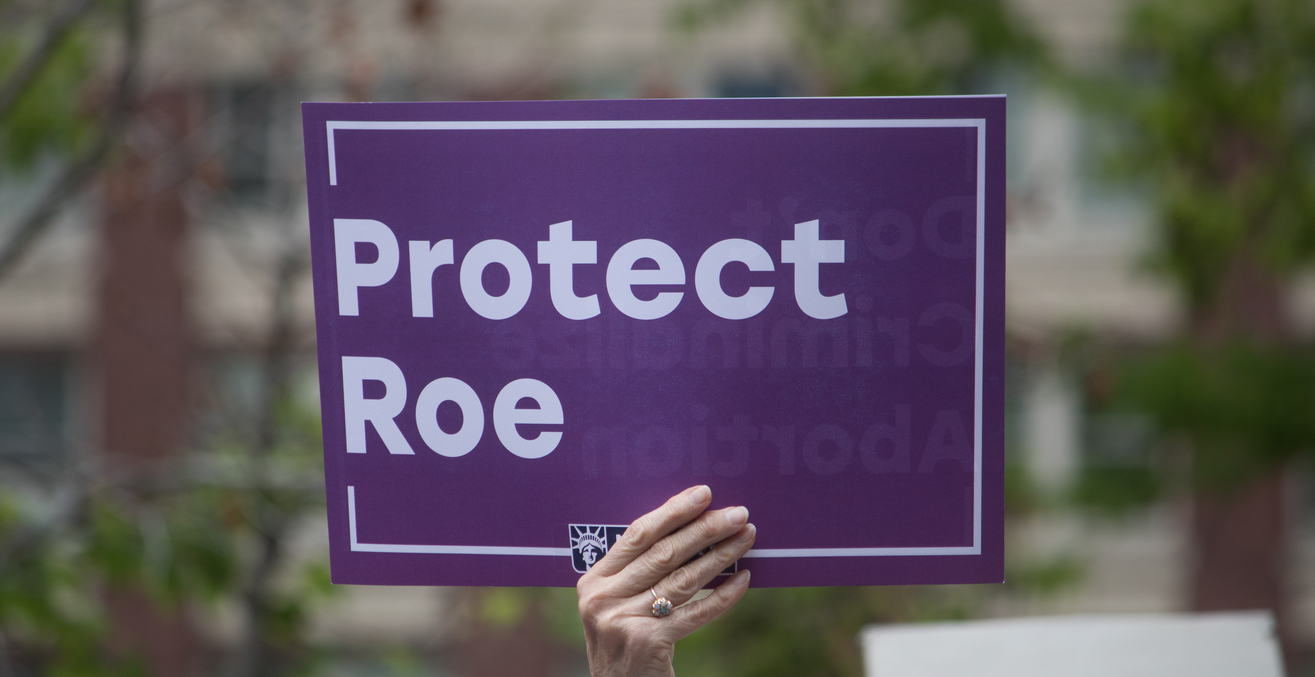Democrats Can’t Make Compromises On Abortion And Still Call Themselves Champions Of Women’s Rights

Reproductive rights are under attack in America. The Republican Party might be the anti-abortion party, but the Democratic Party is failing women across the United States.
When Supreme Court Associate Justice Samuel Alito’s draft majority opinion on Dobbs v. Jackson leaked on 2 May, the United States realised the Supreme Court was poised to overturn the 1973 Roe v. Wade decision that legalised abortion in the United States.
To many, the decision comes as no surprise. The Republican Party has worked tirelessly over the last 50 years to overturn Roe, stacking lower courts with anti-abortion judges, filling the state and federal legislatures with anti-abortion representatives, and supporting the appointment of anti-abortion judges to the U.S. Supreme Court. With striking down Roe now all-but-guaranteed, the Democratic Party has completely surrendered.
The Republican Strategy
During the 2016-2020 administration of President Donald Trump, the Republican strategy paid off big time. President Trump appointed more than 220 conservative lower court judges, paving the way for anti-choice state legislators to introduce abortion restrictions, like the Texas “bounty law” that allows private citizens to sue women and abortion providers. At the federal level, Trump appointed three Supreme Court judges, creating the conservative majority ready to overturn Roe v. Wade as soon as the right case arrived.
Dobbs v. Jackson was just that case. The 2018 Mississippi law bans abortion at 15 weeks of pregnancy, two months earlier than Roe and prior to foetal viability (estimated at 24 weeks). Dobbs would repeal Roe by rejecting the earlier Court’s interpretations that the 14th Amendment to the U.S. Constitution implies a right to privacy. Without a constitutional right to privacy, Roe falls—as might decisions made on the same basis, like the 1972 Eisentstadt v. Baird ruling which legalised birth control, and the 2015 Obergefell v. Hodges ruling that legalised same-sex marriage.
If Roe is overturned — abortion access reverts the states, where federalism yields a patchwork of laws. Only 16 states protect the right to abortion. Twenty-three states have restrictive laws, including 13 with “trigger laws” that would automatically outlaw abortion the minute Roe v. Wade falls. Following the Dobbs leak, states rushed to pass even more restrictions, such as the recent Oklahoma bill that prohibits abortion from the moment of fertilisation.
Where are the Democrats?
The move of Republican-controlled states to criminalise abortion has been happening for decades. Yet the Democratic Party’s response amounts to some mild protestations.
The few notable Democrats, such as U.S. Senators and former presidential candidates Elizabeth Warren of Massachusetts and New York’s Kirsten Gillibrand, who have delivered fiery and angry speeches have acted independent of the party. Nancy Pelosi, the Democrats’ leader in the House of Representatives, instead designed a bland public message campaign reminding people about well-known facts, like how ending Roe makes abortion illegal in many parts of the United States.
The White House has said even less. According to The Washington Post, the leak caught the president’s team by surprise and left them scrambling. President Joe Biden is himself a devout Catholic, and has previously criticised Roe v. Wade as too expansive. In the 2020 Democratic presidential primary, Biden even expressed support for the Hyde Amendment, which has long banned federal funds for abortion. His lacklustre statement the morning after the Dobbs leak defended Roe on the mere grounds of precedent, saying that keeping Roe reflected “basic fairness and stability” and that Democrats needed to elect more pro-choice lawmakers.
Adding to the perception that Biden appears unwilling or unable to lead a midnight charge for abortion rights, he never said the word abortion out loud until shortly after the leak. His silence on whether abortion is a women’s right, rather than just an established policy, speaks for itself.
In sum, the Democrats’ official strategy amounts to a tepid endorsement of federal protection for abortion rights. They are essentially resigned to allowing abortion’s legality to revert to the states.
No Real Path
Of course, the resignation emerges because Democrats’ sole federal option, having the U.S. Congress codify Roe by passing a federal law that legalises abortion, is dead on arrival.
Democrats have the majority in the House of Representatives and the Senate, and even Biden has said he would sign a federal law. Yet the Democratic coalition falls apart on abortion, and even if it held, it’s not enough.
Senate rules allow for a filibuster, meaning the opposition can delay a plenary vote through unlimited debate. To end the filibuster and force a vote, a bill’s proponents need 60 votes. With the Republicans poised to filibuster any pro-choice legislation, the Democrats, who hold 48 seats and count on two votes from independents, would need at least ten Republican senators to vote with them.
Democrats have nowhere near 60 votes. The Women’s Health Protection Act (WHPA), which prohibits government restrictions on abortion, passed the U.S. House in 2021. Prior to the Dobbs leak, the WHPA failed to reach 60 Senate votes. In a second Senate vote immediately following the leak, the WHPA again failed to advance 49-51. The holdout is Democratic Senator Joe Manchin of West Virginia. Between Manchin and co-partisan Senator Bob Casey from Pennsylvania, who voted for the WHPA but has expressed anti-choice views, the Democrats lack agreement within their own caucus.
Pelosi and Biden know full well they do not have the votes. The problem is they are not even trying. They aren’t going door-to-door on Capitol Hill to rally the troops. They aren’t delivering press conferences exhorting action, or at least shaming the Court or Republicans. They have not even suggested abolishing the filibuster, a long hated feature of Senate procedures.
True, Democratic Senators Manchin and Kyrsten Sinema of Arizona oppose filibuster reform, but a symbolic door-knocking, a rousing press conference, or a doomed legislative effort might at least reassure women voters, long a reliable Democratic voting bloc.
What’s Next?
Pelosi’s strategy of using the looming end of abortion rights to gain ground in the November 2022 midterm elections is reasonable given the constraints on federal action — but it’s hardly an impassioned defence of abortion rights.
The Democrats are leaning heavily on public opinion data showing that 61 percent of United States adults say abortion should be legal in all or most cases. Vice President Kamala Harris has echoed the party line, focusing on public opinion and voter turnout, stating “the Senate is not where the majority of Americans are in this nation … the priority should be to elect pro-choice leaders at the local, state, and federal level.”
Democratic candidates have integrated abortion into campaign ads but when the rubber hits the road, winning still trumps women’s rights. Take anti-abortion Democratic representative Henry Cuellar of Texas, who faces pro-choice challenger Jessica Cisneros in a primary this month. Cisneros is a progressive woman of colour — exactly the electoral cohort that Democrats claim they are courting. Yet South Carolina Representative Jim Clyburn, the third-ranked Democrat, campaigned for Cuellar. Pelosi threw her support to Cuellar, calling him “a valued member of our caucus.”
With Democrats putting their weight behind anti-choice men like Cuellar and Manchin, it’s hard to credence their sincerity about electing pro-choice candidates. When combined with resignation about federal inaction, it tells women that the party just doesn’t have their back.
Dr Malliga Och is Associate Professor of Global Politics at Idaho State University in the United States. She is an expert on women and politics focusing on conservative women in Europe and the United States. Her research has been featured in The Conversation, UN Women Working Papers, and Gender & Development and she has been quoted as an expert in USA Today and the Philadelphia Inquirer, among others. Twitter: @malligao
Dr Jennifer M. Piscopo is Associate Professor of Politics and Director of the Center for Research and Scholarship at Occidental College in Los Angeles, United States. She publishes widely on women and electoral politics in Latin America, the United States, and the globe. Her commentary and analysis have appeared in The Washington Post, The New York Times, The Smithsonian Magazine, Foreign Policy, and Ms. Magazine, among others. Twitter: @Jennpiscopo
This article is published under a Creative Commons Licence and may be republished with attribution.





